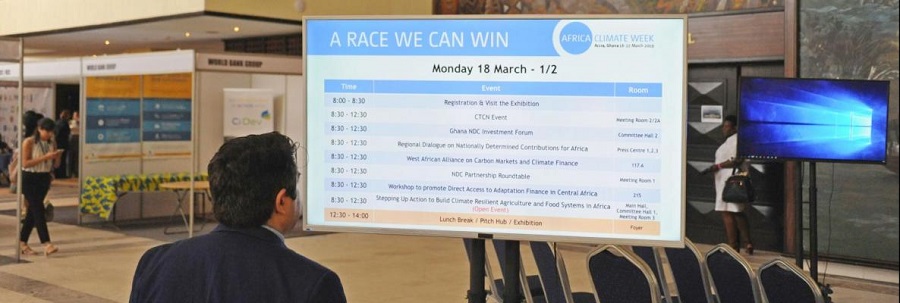Africa, though the lowest contributor to global emissions, remains the most affected continent by climate change. Thousands of climate change actors are now gathered in Ghana for the Africa Climate Week (ACW) to seek ways to forge ahead in mitigating against and adapting to the impacts of a changing global climate.

While the high-level session of the ACW commences on Wednesday, March 20, 2019, the conference has recorded some outcomes from five different sessions of the first open event on Monday, March 18 – FAO & GRP Stepping Up Action to Build Climate Resilient Agriculture and Food Systems in Africa.
Session one, the “Role of Climate Risk analyses for Evidence-Based NDC and NAP Implementation”, had the following outcomes:
- Make the link between science, policy and farmers; bring all stakeholders together to design risk-informed adaption action.
- Share data on climate change impacts and adaptation needs and effectively disseminate research findings across all levels
- Make the business case for adaptation by creating incentives and showing the economic potentials of climate resilience
- Create an enabling environment for farmers to implement adaptation strategies and have access to risk insurance.
Session two, “Nature-Based Solutions 1 – Africa’s Agriculture and Food Systems powered by Nature”, had the following outcomes:
- Key to nature-based transformation lies in shaping and supporting the investment decisions of smallholder farmers, foresters and fishers to adopt risk-driven and informed, integrated farming and land-use planning systems that safeguard biodiversity as well as improve their livelihoods.
- Develop integrative incentive packages that maximize the adoption of improved farming practices at farm and landscapes levels and those that look to longer-term investment horizons
- Smallholder producers need to be active participants in finding solutions and all efforts should be made to integrate local and traditional knowledge with scientific knowledge
- Foster coordination of incentives from local initiatives and private-public partnerships, to integrate between sectors and stakeholders.
Session three, “Colliding Climate and Conflict Risks in Fragile and Vulnerable Context”, had the following outcomes:
- Create platforms for conflicting parties to discuss and address drivers of different types of conflict and climate-related vulnerabilities and leverage joint internets
- Policies for sustainable actions exist need to focus on their implementation and tackling corruption
- Farmer-friendly and equitable, non-traditional financial solutions that prioritise not only profit but also sustainability and resilience and work with and for agroecological solutions
- Scale-out and distribute climate information service technologies.
Session four, “Scaling Up Private Sector Investment That Builds Resilience in Agriculture”, had the following outcomes:
- Tailor partnership to meet client-targeted needs
- Need for strong farmer organisations that link to the private sectors and value chain schemes
- Significantly increase in finance to reach farmers through inclusive business models
- Targeted system solution for different agro-ecologies and farmer types including social safety nets
The last session, “Early Warning – Early Action (EWEA) and Forecast Based Financing: Experiences and Challenges from Africa”, had the following outcomes:
- Early warning is not enough! We need to translate early warning into early action
- EWEA protects livelihoods, reduces humanitarian costs and protects development gains
- Scaling up of EWEA requires coordination, partnerships and institutionalisation in regional and national organisations
- EWEA creates opportunities in the agriculture and food sector based on risk-informed investment.
The one-week long event that comes to a close on Friday, March 22, according to the United Nations Framework Convention on Climate Change (UNFCCC), will guide Africa as the world is entering a new era of ambition – where all people, nations, and organisations must come together to urgently increase action to meet the 1.5C temperature goal.
By ‘Seyifunmi Adebote, Accra, Ghana
